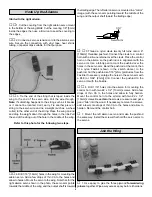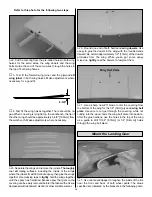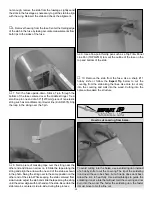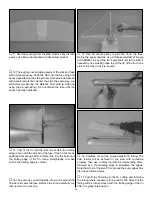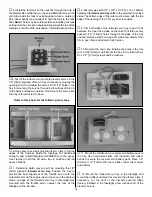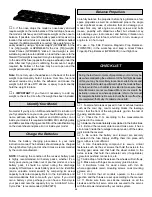
Refer to this photo while mounting the tail gear.
❏
1. Drill a 1/8" [3.2mm] hole through the middle of the
bottom of the fuse for the tail gear wire 5-7/8" [150mm] from
the aft end. Optional: Use a 5/32" brass tube sharpened at
one end to drill the hole. Cut 1" [25mm] from the end of the
brass tube and glue it into the hole. This will provide a
bearing for the tail gear wire.
❏
2. Insert the tail gear wire into the hole (or brass tube).
Place two nylon hump-straps on the wire where shown in
the photo. Accurately mark the center of the holes in the
straps onto the bottom of the fuse.
❏
3. Drill 5/32" [4mm] holes (or use the 5/32" brass tube to
make the holes) all the way through the bottom of the fuse
at the marks.
❏
4. Cut four 1" [25mm] pieces from the 36" [910mm] plastic
tube (the one with the ridges). Use thick CA or epoxy to glue
a tube in each of the four holes. Note: If using thick CA, work
quickly. If necessary, use a small mallet or a wood block to
tap the tubes down into the holes before the CA takes hold.
❏
5. Mount the tail gear to the fuse with the straps and four
#2 x 1/2" [13mm] screws.
❏
6. Use a 3/16" [4.8mm] brass tube sharpened on one end to
cut a hole through the bottom of the fuse in alignment with the
arm on the right side of the tail gear. The angle of the hole does
not have to be precise because when installed, the pushrod will
be bent as necessary to align with the steering arm.
❏
7. Roughen one end of the 3/16" x 36" [4.8 x 910mm]
pushrod tube. Guide the tube through the fuse, so the
roughened end is in the hole, then cut the front of the tube
approximately 2" [50mm] short of the rudder servo arm. Glue
the tube in the hole and trim it even with the bottom of the fuse.
❏
8. Mount the 0-80 threaded ball to the outer hole of the
tail wheel steering arm with an 0-80 nut and a small drop of
threadlocker. Make the tail wheel pushrod from a 2-56 x 36"
[910mm] pushrod with a nylon ball link on the aft end. Install
RETAINER
Mount the Tailgear
20




